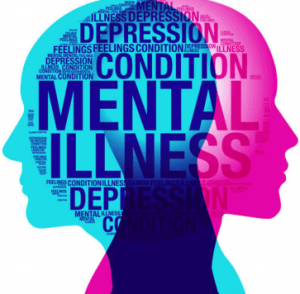We open a new week reflecting on more young lives negatively impacted by violence, families mourning lives lost and picking up the pieces to offer support through the grieving process. For our relatively small population, the increasing occurrence of graphic youth-onyouth violence is troubling, especially where it is perpetuated among kin who are often raised together. Investigations into the emotional state of those involved in these very unfortunate incidents all too often reveals that there was mental trauma and/or other types of abuse that went untreated and, over time, may have played critical roles in the final major incident. This brings to the fore the mental health of our youth. The rather timely theme for World Mental Health Day 2020 is Mental Health: Beyond A Healthy Body. According to the World Health Organization, around the world one in four people will suffer from a mental health disorder, yet about 60 percent of sufferers do not seek help.
Half of all mental health conditions start by 14 years of age, but most cases are undetected and untreated. Further, the consequences of not addressing youth mental health conditions are likely to extend into adulthood with implications for both physical and mental health and negatively impacting opportunities for fulfilling adult lives. Our Antigua and Barbuda experience has largely made open acknowledgement of the mental health issues taboo and young people are particularly affected. Too often, mental health challenges are diagnosed as insubordination and/or surly behaviour and, save for the unstructured interventions, the affected youth is left to find their own way with negative consequences for the quality of life as an adult.
In times past, many of our young people were saved by ‘the village’; that group of grandparents, aunties, uncles and neighbors who would serve as a safety net and provide the nurturing and support necessary to cushion mental health issues. In instances of youth-onyouth violence, what happens to the immediate family? How do the parents, biological and surrogates, address these very difficult conundrums? How do they cope with the judgement from society on their parental skills? How do they separate grief for the lost loved one from the perceived obligation to support the accused? Is there room to acknowledge that their mental health is also at risk and in need of support? As our society matures, evolution has lessened the role of ‘the village’ without providing replacement social constructs to address mental health challenges particularly among youth.
While we have scores of highly trained counselors and therapists, stigma and various other reasons work against people’s willingness to access support services as part of treatment. Stigma also forces adults to refuse to acknowledge their own mental health challenges and could result in perpetuation of intergenerational mental health disorders. There is also the impact of mental health challenges on productivity. An unhealthy mind will impact the ability to focus on duties and responsibilities associated with work, study and social interaction. Individuals facing mental health disorders, if left untreated, will eventually suffer from unhealthy bodies. Has the time come for us to take a serious look addressing the poorly kept secret scorn against accessing mental health services and professionals? Is there a need for families to be educated on the signs and symptoms of mental illness which could lead to decisions to access the expert services our nation’s youth quite often need? Are we as adults aware ourselves of the need for mental health checkups and that good mental health is as important as the annual physical checkup? Are we ready to set aside the stereotypes and bullying and engage in a place which is more open, inviting and disarming? It is clear that a broadbased approach to this issue is an urgent need.
We must begin to seriously dig deep and build systems to facilitate discussions on mental health, provide systems to facilitate open discussions and provide broad-based systems that reduce the incidence of ‘write off’. We at Pointville Communications
